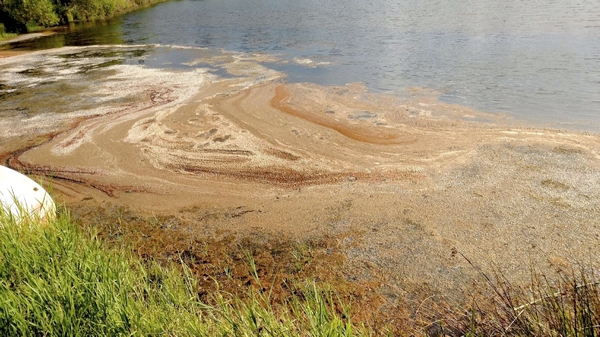Pond problems come with lack of oxygen
Published 12:00 am Friday, August 19, 2016

- Cooperative Extension Algae growth can be a problem in ponds during hot summers, reducing oxygen for the creatures living in the pond.
By Amy-Lynn Albertson
Rowan County Extension Director
SALISBURY — Just about every old homeplace or farm has a pond. Ponds can be lots of fun for fishing, swimming and other aquatic recreation. Ponds are also extremely useful for irrigation of plants and watering animals.
But when there is a problem with your pond it can be a real hassle. Some of the most common problems with ponds are fish kill, balance of fish species and aquatic weeds.
Fish die from a variety of natural causes — when you see a few dead fish in the pond it’s usually nothing to worry about. However, if you are seeing large numbers of fish die over the course of a few days, it’s time to worry.
A common cause of fish kill is oxygen depletion. During hot weather, most ponds have a layer of water near the bottom that contains little or no dissolved oxygen. When high winds or cold rain cause this water to mix with the upper pond water, oxygen levels often drop low enough to kill fish. Oxygen depletion also occurs when dead algae or other plants decay in the pond after herbicides have been applied to control weeds.
Preventing oxygen depletion is difficult, but there are a few things you can do as a pond owner to help. First, don’t over-fertilize your pond, follow the prescribed guideline for fertilization. Keep livestock from wading in the pond and don’t allow animal waste in the pond.
During extremely hot weather, like what we have been experiencing the last few weeks, check your pond regularly at sunrise for signs of stressed fish. If you see fish at the pond surface gulping for air, stop feeding the fish and aerate the pond as soon as possible. Circulate the water in the pond to add oxygen, by running an outboard motor around the pond or using an irrigation pump.
Aquatic weeds can be a serious problem in a pond. They can mess with fishing, boating, swimming and irrigation. When there are a lot of weeds, fish like bream can become overcrowded and stunted because the weeds keep the bass from being able to reduce their numbers.
Extremely dense growths of filamentous algae and submerged weeds may also cause fish kills as a result of nighttime oxygen depletion. Weeds that root to the bottom or begin forming on the bottom are usually a problem only in ponds that are shallow or have shallow areas (water less than 24 inches deep).
Anytime sunlight can penetrate to the pond bottom, rooted aquatic weeds and filamentous algae may become established. Once established, many weeds have the ability to spread to deeper water.
Problems with algae and floating weeds like duckweed usually develop in very fertile ponds. Ponds that receive runoff from livestock operations or other nutrient-rich areas are prime candidates for duckweed and algal problems.
A farm pond management workshop will be held on Sept. 12 at L.L. Goodnight and Sons in China Grove from 5-8 p.m. Experts from N.C. State University, NCDA & CS and Foster Lake & Pond Management Inc, will cover pond design, engineering, permitting and construction, fish species ID, weed ID and control methods.
If you have pond weeds that you want identified, bring them with you. This workshop is free and will have a sponsored hot dog meal with it. Registration is required. Please call 704-216-8970 by Sept. 9. This program is outdoors and will happen rain or shine.




